北师大版(2019)选择性必修 第一册Unit 3 Conservation Lesson 1 The Sixth Extinction Period 2课件 (共23张PPT)
文档属性
| 名称 | 北师大版(2019)选择性必修 第一册Unit 3 Conservation Lesson 1 The Sixth Extinction Period 2课件 (共23张PPT) | 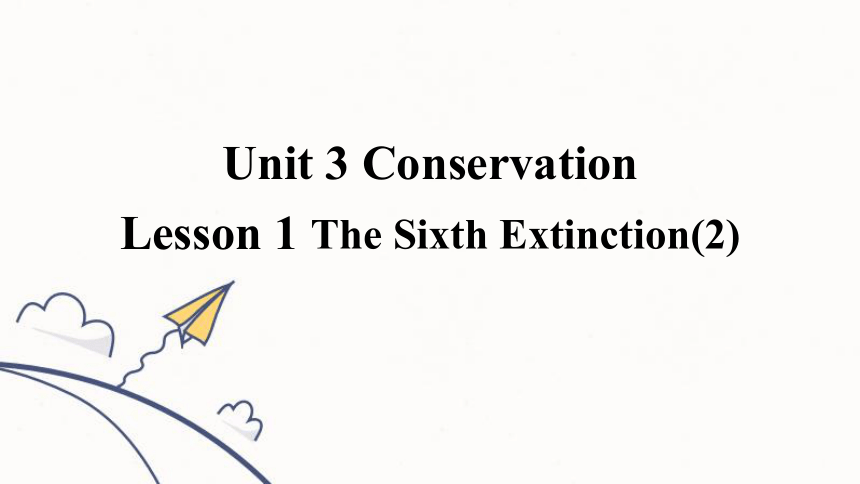 | |
| 格式 | pptx | ||
| 文件大小 | 521.2KB | ||
| 资源类型 | 教案 | ||
| 版本资源 | 北师大版(2019) | ||
| 科目 | 英语 | ||
| 更新时间 | 2024-10-12 22:45:03 | ||
图片预览

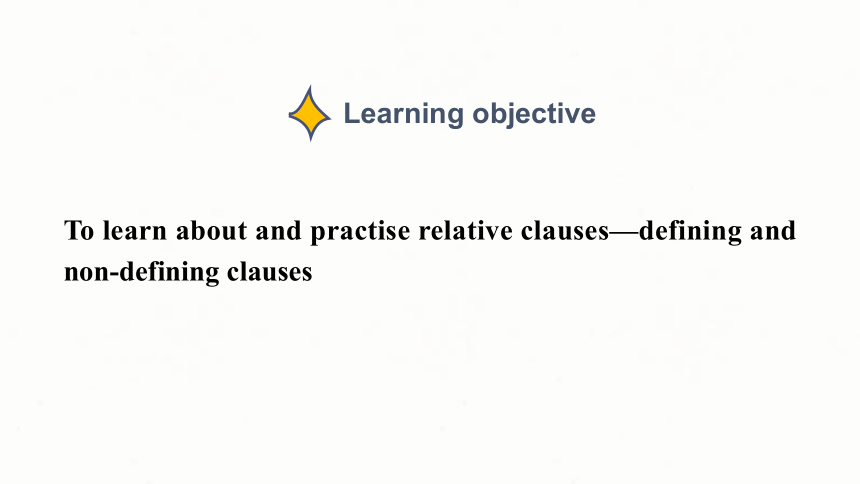
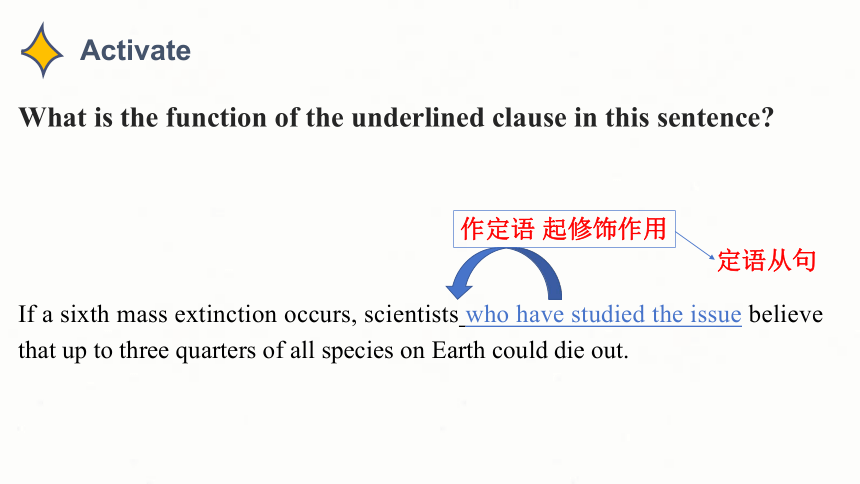
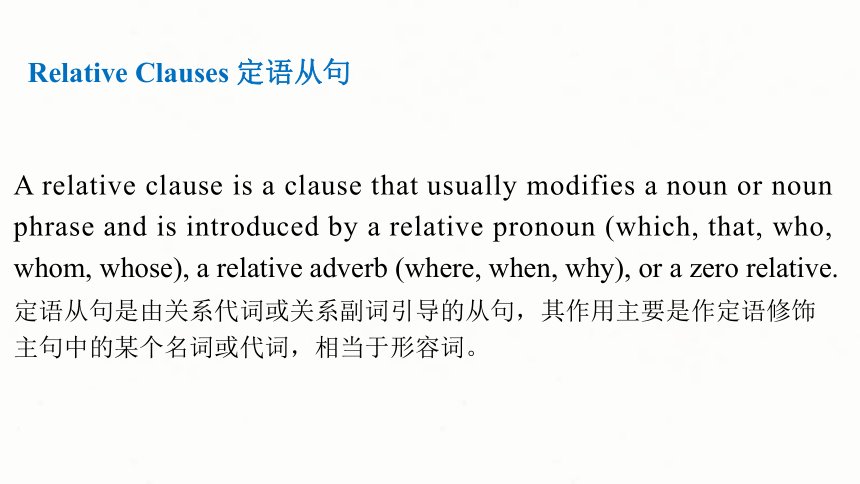
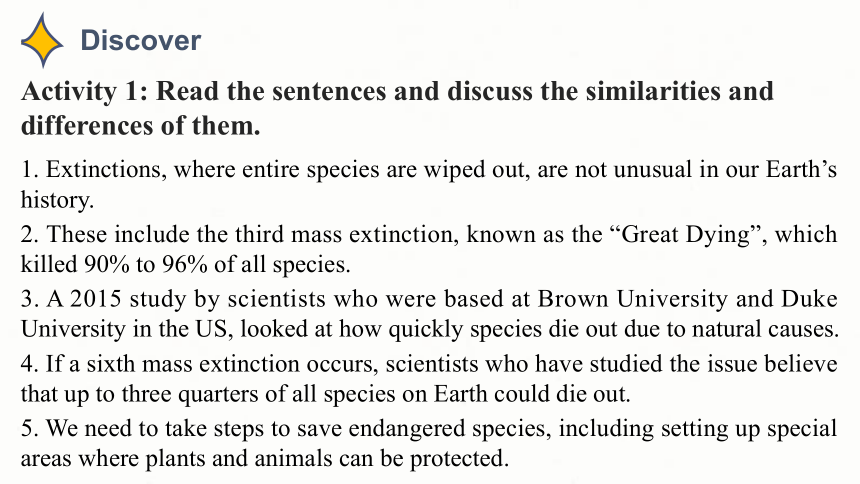
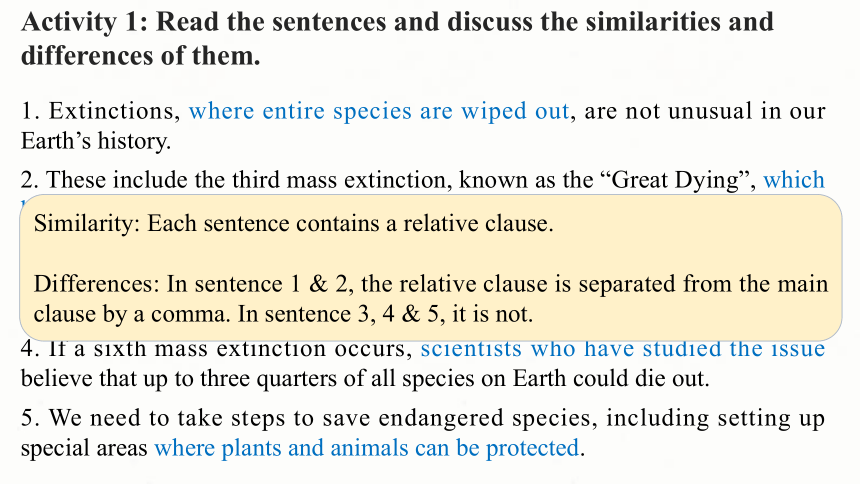
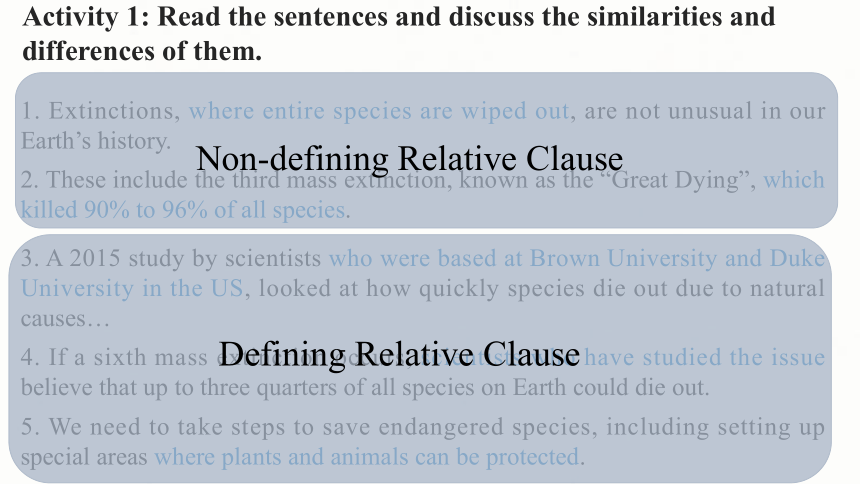
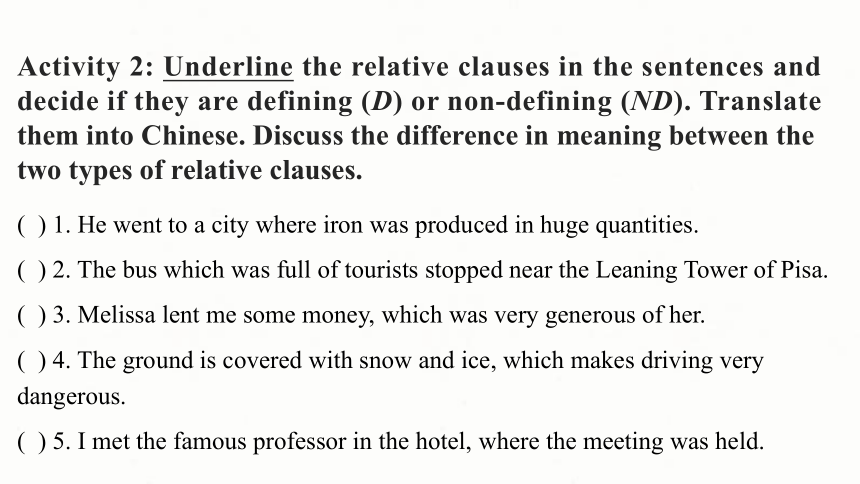

文档简介
(共23张PPT)
Unit 3 Conservation
Lesson 1 The Sixth Extinction(2)
To learn about and practise relative clauses—defining and non-defining clauses
Learning objective
What is the function of the underlined clause in this sentence
If a sixth mass extinction occurs, scientists who have studied the issue believe that up to three quarters of all species on Earth could die out.
作定语 起修饰作用
定语从句
Activate
Relative Clauses 定语从句
A relative clause is a clause that usually modifies a noun or noun phrase and is introduced by a relative pronoun (which, that, who, whom, whose), a relative adverb (where, when, why), or a zero relative.
定语从句是由关系代词或关系副词引导的从句,其作用主要是作定语修饰主句中的某个名词或代词,相当于形容词。
Activity 1: Read the sentences and discuss the similarities and differences of them.
1. Extinctions, where entire species are wiped out, are not unusual in our Earth’s history.
2. These include the third mass extinction, known as the “Great Dying”, which killed 90% to 96% of all species.
3. A 2015 study by scientists who were based at Brown University and Duke University in the US, looked at how quickly species die out due to natural causes.
4. If a sixth mass extinction occurs, scientists who have studied the issue believe that up to three quarters of all species on Earth could die out.
5. We need to take steps to save endangered species, including setting up special areas where plants and animals can be protected.
Discover
1. Extinctions, where entire species are wiped out, are not unusual in our Earth’s history.
2. These include the third mass extinction, known as the “Great Dying”, which killed 90% to 96% of all species.
3. A 2015 study by scientists who were based at Brown University and Duke University in the US, looked at how quickly species die out due to natural causes…
4. If a sixth mass extinction occurs, scientists who have studied the issue believe that up to three quarters of all species on Earth could die out.
5. We need to take steps to save endangered species, including setting up special areas where plants and animals can be protected.
Similarity: Each sentence contains a relative clause.
Differences: In sentence 1 & 2, the relative clause is separated from the main clause by a comma. In sentence 3, 4 & 5, it is not.
Activity 1: Read the sentences and discuss the similarities and differences of them.
1. Extinctions, where entire species are wiped out, are not unusual in our Earth’s history.
2. These include the third mass extinction, known as the “Great Dying”, which killed 90% to 96% of all species.
3. A 2015 study by scientists who were based at Brown University and Duke University in the US, looked at how quickly species die out due to natural causes…
4. If a sixth mass extinction occurs, scientists who have studied the issue believe that up to three quarters of all species on Earth could die out.
5. We need to take steps to save endangered species, including setting up special areas where plants and animals can be protected.
Defining Relative Clause
Non-defining Relative Clause
Activity 1: Read the sentences and discuss the similarities and differences of them.
Activity 2: Underline the relative clauses in the sentences and decide if they are defining (D) or non-defining (ND). Translate them into Chinese. Discuss the difference in meaning between the two types of relative clauses.
( ) 1. He went to a city where iron was produced in huge quantities.
( ) 2. The bus which was full of tourists stopped near the Leaning Tower of Pisa.
( ) 3. Melissa lent me some money, which was very generous of her.
( ) 4. The ground is covered with snow and ice, which makes driving very dangerous.
( ) 5. I met the famous professor in the hotel, where the meeting was held.
( ) 1. He went to a city where iron was produced in huge quantities.
他去了一个盛产铁的城市。
( ) 2. The bus which was full of tourists stopped near the Leaning Tower of Pisa.
满载游客的公共汽车停在了比萨斜塔附近。
( ) 3. Melissa lent me some money, which was very generous of her.
梅利莎借给我一些钱,她真是慷慨大方。
( ) 4.The ground is covered with snow and ice, which makes driving very dangerous.
地上满是冰雪,开车很危险。
( ) 5. I met the famous professor in the hotel, where the meeting was held.
我在酒店里遇到了这位著名的教授,就是正在开会的那家酒店。
D
D
ND
ND
ND
Relative Clauses– Defining & Non-defining Relative Clauses
There are two kinds of relative clauses: Defining Relative Clauses and Non-defining Relative Clauses.
Defining Relative Clauses identify nouns or pronouns. They make clear which person or thing, etc. is being referred to.
定语从句有两种:限制性定语从句和非限制性定语从句;
限制性定语从句修饰名词或代词,表明所修饰的是哪个人或物。
The girl who is playing tennis is my friend.
This is the place where I hid the key.
Non-defining Relative Clauses give extra information which is not necessary to the meaning of the sentence. These clauses need commas.
非限制性定语从句提供句子意义以外的额外信息,要用逗号与主句隔开。
The accident, which happened yesterday, has led to three deaths.
The building, where an important conference is being held, is in the centre of the city.
Relative Clauses– Defining & Non-defining Relative Clauses
Relative Clauses– Defining vs. Non-defining Relative Clauses
在句中作用不同
限制性定语从句对被修饰的先行词有限定制约作用,使该词的含义更具体,更明确。限制性定语从句不能被省略,否则句意不完整。
非限制性定语只是对先行词作一些附加说明,不起限定制约作用。如果省略,主句的意义仍然完整。
People who take physical exercise live longer.
His daughter, who is in Boston now, is coming home next week.
2. 先行词不同
2.1 限制性定语从句的先行词只能是名词和代词,而非限制性定语从句的先行词则还可以是整个句子或句子的一部分。此时,从句通常由关系代词 which 引导,且从句谓语动词要用第三人称单数。
It is snowing heavily, which makes children feel excited. (which 指整个主句)
Peter drove too fast, which was dangerous. (which 指drive too fast)
Relative Clauses– Defining vs. Non-defining Relative Clauses
2. 先行词不同
2.2 当先行词为专有名词或其他具有独一无二性的普通名词时,通常要用非限制性定语从句,而不用限制性定语从句。
Mr. Smith, who is our boss, will leave for Japan next week.(先行词为专有名词)
Her father, who has a lot of money, wishes her to study abroad. (先行词为表独一无二意义的普通名词)
Relative Clauses– Defining vs. Non-defining Relative Clauses
3. 关系词不同
3.1 关系词 that 和 why 通常不用于引导非限制性定语从句
3.2 关系代词 whom 在限制性定语从句中作宾语时可用 who 代替,但在非限制性定语从句中不可代替。
This is the girl who/whom I met in the street.
A young man had a new girl friend, whom he wanted to impress.
Relative Clauses– Defining vs. Non-defining Relative Clauses
3. 关系词不同
3.3 当关系代词在限制性定语从句中作宾语时可以省略,但在非限制性定语从句中所有的关系词均不可省略。
This is the book (which/that) he lost yesterday.
The book, which he lost yesterday, has been found.
Relative Clauses– Defining vs. Non-defining Relative Clauses
4. 翻译方式不同
在翻译定语从句时,一般把限制性定语从句翻译为定语,放在它所修饰的先行词之前,而把非限制性定语从句翻译为与主句并列的句子。
He is the man whose car was stolen.
他就是汽车被盗的那个人。
I’v Invited Jim, who lives in the next flat.
我邀请了吉姆,他就住在隔壁公寓。
Relative Clauses– Defining vs. Non-defining Relative Clauses
She heard a terrible noise, ______ brought her heart into her mouth.
Have you ever been to Xi’an, ______I left ten years ago.
The weather turned out to be very good, ______ was more than we could expect.
The letter is from my sister, _____ is working in Beijing.
I still remember the days _________ I spent in Beijing.
Shaoshan, _____ Chairman Mao was born, has become a place of interest.
1. Complete the sentences with relative pronouns or relative adverbs.
which
which
which
who
(which/that)
where
Practice
7. He is good at English, _____ we all know.
8. Do you know the year _____ the Chinese Communist Party was founded
9. The place _________interested me most was the Children’s Palace.
10. He talked a lot about things and persons _______they remembered in the school.
11. I admire Stephen Hawking greatly,______ theory about black holes has a great effect on astronomy.
12. I earn only 1,000 dollars a month, half of ______ is spent on the rent for apartment.
whom
when
which/that
that
whose
which
1.他们将乘飞机去昆明,在那里他们将待两三天。
They will fly to Kunming, where they will stay for two or three days.
2.老人有两个女儿,其中一个是医生。
The old man has two daughters, one of whom is a doctor.
3.汤姆努力学习并乐于助人,这正是他父母所期盼的。
Tom studies hard and is ready to help others, which is what his parents expect.
2. Translate the sentences into English, trying to use relative clauses.
4. 钟是一种能告诉人们时间的仪器。
Clock is a kind of instrument which/that can tell people time.
5. 这是他过去居住的地方。
This is the place where he used to live.
6. 一个五岁男孩会讲两门外语,这令所有在场的人感到非常惊讶。
A five-year old boy can speak two foreign languages, which surprises all the people present.
7. 废弃的瓶子和使用过的包装袋扔得到处都是,这彻底破坏了大自然的美景。
Waste bottles and used packages were thrown everywhere, which totally ruined the beauty of the nature.
8. 很多车沿着街道停,这是交通堵塞的直接原因。
A lot of cars are parked along the street, which is the direct cause of traffic jams.
9. 我永远不会忘记我们参加“寻找雷锋”活动的那一天。
I will never forget the day when we joined in the activity— “Looing for Lei Feng”.
Finish the exercises of relative clauses.
Homework
Unit 3 Conservation
Lesson 1 The Sixth Extinction(2)
To learn about and practise relative clauses—defining and non-defining clauses
Learning objective
What is the function of the underlined clause in this sentence
If a sixth mass extinction occurs, scientists who have studied the issue believe that up to three quarters of all species on Earth could die out.
作定语 起修饰作用
定语从句
Activate
Relative Clauses 定语从句
A relative clause is a clause that usually modifies a noun or noun phrase and is introduced by a relative pronoun (which, that, who, whom, whose), a relative adverb (where, when, why), or a zero relative.
定语从句是由关系代词或关系副词引导的从句,其作用主要是作定语修饰主句中的某个名词或代词,相当于形容词。
Activity 1: Read the sentences and discuss the similarities and differences of them.
1. Extinctions, where entire species are wiped out, are not unusual in our Earth’s history.
2. These include the third mass extinction, known as the “Great Dying”, which killed 90% to 96% of all species.
3. A 2015 study by scientists who were based at Brown University and Duke University in the US, looked at how quickly species die out due to natural causes.
4. If a sixth mass extinction occurs, scientists who have studied the issue believe that up to three quarters of all species on Earth could die out.
5. We need to take steps to save endangered species, including setting up special areas where plants and animals can be protected.
Discover
1. Extinctions, where entire species are wiped out, are not unusual in our Earth’s history.
2. These include the third mass extinction, known as the “Great Dying”, which killed 90% to 96% of all species.
3. A 2015 study by scientists who were based at Brown University and Duke University in the US, looked at how quickly species die out due to natural causes…
4. If a sixth mass extinction occurs, scientists who have studied the issue believe that up to three quarters of all species on Earth could die out.
5. We need to take steps to save endangered species, including setting up special areas where plants and animals can be protected.
Similarity: Each sentence contains a relative clause.
Differences: In sentence 1 & 2, the relative clause is separated from the main clause by a comma. In sentence 3, 4 & 5, it is not.
Activity 1: Read the sentences and discuss the similarities and differences of them.
1. Extinctions, where entire species are wiped out, are not unusual in our Earth’s history.
2. These include the third mass extinction, known as the “Great Dying”, which killed 90% to 96% of all species.
3. A 2015 study by scientists who were based at Brown University and Duke University in the US, looked at how quickly species die out due to natural causes…
4. If a sixth mass extinction occurs, scientists who have studied the issue believe that up to three quarters of all species on Earth could die out.
5. We need to take steps to save endangered species, including setting up special areas where plants and animals can be protected.
Defining Relative Clause
Non-defining Relative Clause
Activity 1: Read the sentences and discuss the similarities and differences of them.
Activity 2: Underline the relative clauses in the sentences and decide if they are defining (D) or non-defining (ND). Translate them into Chinese. Discuss the difference in meaning between the two types of relative clauses.
( ) 1. He went to a city where iron was produced in huge quantities.
( ) 2. The bus which was full of tourists stopped near the Leaning Tower of Pisa.
( ) 3. Melissa lent me some money, which was very generous of her.
( ) 4. The ground is covered with snow and ice, which makes driving very dangerous.
( ) 5. I met the famous professor in the hotel, where the meeting was held.
( ) 1. He went to a city where iron was produced in huge quantities.
他去了一个盛产铁的城市。
( ) 2. The bus which was full of tourists stopped near the Leaning Tower of Pisa.
满载游客的公共汽车停在了比萨斜塔附近。
( ) 3. Melissa lent me some money, which was very generous of her.
梅利莎借给我一些钱,她真是慷慨大方。
( ) 4.The ground is covered with snow and ice, which makes driving very dangerous.
地上满是冰雪,开车很危险。
( ) 5. I met the famous professor in the hotel, where the meeting was held.
我在酒店里遇到了这位著名的教授,就是正在开会的那家酒店。
D
D
ND
ND
ND
Relative Clauses– Defining & Non-defining Relative Clauses
There are two kinds of relative clauses: Defining Relative Clauses and Non-defining Relative Clauses.
Defining Relative Clauses identify nouns or pronouns. They make clear which person or thing, etc. is being referred to.
定语从句有两种:限制性定语从句和非限制性定语从句;
限制性定语从句修饰名词或代词,表明所修饰的是哪个人或物。
The girl who is playing tennis is my friend.
This is the place where I hid the key.
Non-defining Relative Clauses give extra information which is not necessary to the meaning of the sentence. These clauses need commas.
非限制性定语从句提供句子意义以外的额外信息,要用逗号与主句隔开。
The accident, which happened yesterday, has led to three deaths.
The building, where an important conference is being held, is in the centre of the city.
Relative Clauses– Defining & Non-defining Relative Clauses
Relative Clauses– Defining vs. Non-defining Relative Clauses
在句中作用不同
限制性定语从句对被修饰的先行词有限定制约作用,使该词的含义更具体,更明确。限制性定语从句不能被省略,否则句意不完整。
非限制性定语只是对先行词作一些附加说明,不起限定制约作用。如果省略,主句的意义仍然完整。
People who take physical exercise live longer.
His daughter, who is in Boston now, is coming home next week.
2. 先行词不同
2.1 限制性定语从句的先行词只能是名词和代词,而非限制性定语从句的先行词则还可以是整个句子或句子的一部分。此时,从句通常由关系代词 which 引导,且从句谓语动词要用第三人称单数。
It is snowing heavily, which makes children feel excited. (which 指整个主句)
Peter drove too fast, which was dangerous. (which 指drive too fast)
Relative Clauses– Defining vs. Non-defining Relative Clauses
2. 先行词不同
2.2 当先行词为专有名词或其他具有独一无二性的普通名词时,通常要用非限制性定语从句,而不用限制性定语从句。
Mr. Smith, who is our boss, will leave for Japan next week.(先行词为专有名词)
Her father, who has a lot of money, wishes her to study abroad. (先行词为表独一无二意义的普通名词)
Relative Clauses– Defining vs. Non-defining Relative Clauses
3. 关系词不同
3.1 关系词 that 和 why 通常不用于引导非限制性定语从句
3.2 关系代词 whom 在限制性定语从句中作宾语时可用 who 代替,但在非限制性定语从句中不可代替。
This is the girl who/whom I met in the street.
A young man had a new girl friend, whom he wanted to impress.
Relative Clauses– Defining vs. Non-defining Relative Clauses
3. 关系词不同
3.3 当关系代词在限制性定语从句中作宾语时可以省略,但在非限制性定语从句中所有的关系词均不可省略。
This is the book (which/that) he lost yesterday.
The book, which he lost yesterday, has been found.
Relative Clauses– Defining vs. Non-defining Relative Clauses
4. 翻译方式不同
在翻译定语从句时,一般把限制性定语从句翻译为定语,放在它所修饰的先行词之前,而把非限制性定语从句翻译为与主句并列的句子。
He is the man whose car was stolen.
他就是汽车被盗的那个人。
I’v Invited Jim, who lives in the next flat.
我邀请了吉姆,他就住在隔壁公寓。
Relative Clauses– Defining vs. Non-defining Relative Clauses
She heard a terrible noise, ______ brought her heart into her mouth.
Have you ever been to Xi’an, ______I left ten years ago.
The weather turned out to be very good, ______ was more than we could expect.
The letter is from my sister, _____ is working in Beijing.
I still remember the days _________ I spent in Beijing.
Shaoshan, _____ Chairman Mao was born, has become a place of interest.
1. Complete the sentences with relative pronouns or relative adverbs.
which
which
which
who
(which/that)
where
Practice
7. He is good at English, _____ we all know.
8. Do you know the year _____ the Chinese Communist Party was founded
9. The place _________interested me most was the Children’s Palace.
10. He talked a lot about things and persons _______they remembered in the school.
11. I admire Stephen Hawking greatly,______ theory about black holes has a great effect on astronomy.
12. I earn only 1,000 dollars a month, half of ______ is spent on the rent for apartment.
whom
when
which/that
that
whose
which
1.他们将乘飞机去昆明,在那里他们将待两三天。
They will fly to Kunming, where they will stay for two or three days.
2.老人有两个女儿,其中一个是医生。
The old man has two daughters, one of whom is a doctor.
3.汤姆努力学习并乐于助人,这正是他父母所期盼的。
Tom studies hard and is ready to help others, which is what his parents expect.
2. Translate the sentences into English, trying to use relative clauses.
4. 钟是一种能告诉人们时间的仪器。
Clock is a kind of instrument which/that can tell people time.
5. 这是他过去居住的地方。
This is the place where he used to live.
6. 一个五岁男孩会讲两门外语,这令所有在场的人感到非常惊讶。
A five-year old boy can speak two foreign languages, which surprises all the people present.
7. 废弃的瓶子和使用过的包装袋扔得到处都是,这彻底破坏了大自然的美景。
Waste bottles and used packages were thrown everywhere, which totally ruined the beauty of the nature.
8. 很多车沿着街道停,这是交通堵塞的直接原因。
A lot of cars are parked along the street, which is the direct cause of traffic jams.
9. 我永远不会忘记我们参加“寻找雷锋”活动的那一天。
I will never forget the day when we joined in the activity— “Looing for Lei Feng”.
Finish the exercises of relative clauses.
Homework
同课章节目录
- Unit 1 Relationshis
- Lesson 1 Teachers
- Lesson 2 How Do We Like Teachers’ Feedback?
- Lesson 3 So Close,Yet So Fa
- Unit 2 Success
- Lesson 1 Money vs Success
- Lesson 2 Top Five Secrets of Success
- Lesson 3 Getting to the Top
- Unit 3 Conservation
- Lesson 1 The Sixth Extinction
- Lesson 2 War on Plastic Packets
- Lesson 3 The Road to Destruction
